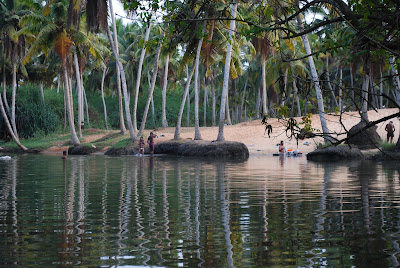I recently returned from a trip home to India. These homecomings have been occurring every
two to two-and-a-half years, and each time I have been back home over the last nine
years, I have traveled to a new part of the country. I have in time been to Darjeeling and West
Bengal, Gangtok and Sikkim, the Golden Triangle (Delhi, Jaipur, and Agra), Goa, and
now, Kerala, known more recently due to tourism advertising as “God’s Own
Country.”
Kerala is truly magnificent.
Lying slender on the western coast of Southern India, it is shaped kind
of like Chile. The coasts are chock full
of gorgeous beaches, and the hillside and mountains, just a few kilometers in,
are the site of tea plantations that supply 20% of India’s tea production. But perhaps the most beautiful parts of
Kerala, I think, are the backwaters that hug the shoreline. This is where coconut trees droop over marshy
lands and freshwater making its way to the sea.
Here are some examples of what I am talking about.
But as I, and others more productively and prolifically,
have written about, there is something that has invaded waters both in Kerala,
the Susquehanna River in Pennsylvania, and the Pacific Ocean—trash, and in
particular, plastic. Plastic was
abundant in the backwaters, and these are only larger fragments that I found at
the surface.
There has been a supposed campaign for a “plastic-free
Kerala.” What this means is very unclear.
Does it mean no plastic at all?
Plastic bags were rare there, but account for just a fraction of all the
plastic used and thrown. What about
bottles, like this one? Here is my dad
posing by a "Plastic-Free Zone" sign, with plastic calmly worshipping the
posts. In the backwaters, I actually saw a man clean some
sort of plastic off of the propeller of his boat by nonchalantly throwing the plastic back
into the water.
In his TED talk from 2004, James Howard Kunstler, a wonderfully
foul-mouthed urban planner and critic of suburban sprawl, spoke about places worth caring about. He talks about how form and design of places
influences people’s behaviour in these places, and how "public spaces should be inspired centers of civic life and the physical manifestation of the common good."
He contrasts public spaces and buildings and homes in America with the tight
courtyards you find more commonly in Europe.
Indeed, places worth caring about make us want to protect them, to nurture
them, and to make changes to them only so intentionally. And I think his sentiments translate directly to man and caring for the spaces that nature has created.
As I wrote about when I returned from India
two-and-a-half years ago, does cleanliness mean anything to a country
desensitized to public trash heaps?
Indeed, are these places worth caring for? And if we do care, does that care result in us just hiding away trash as we do in the West, or asking deeper questions such as "Why trash?" or, as Kunstler makes us ask, "Where we are going?"
More on places worth caring for next time.
More on places worth caring for next time.
















